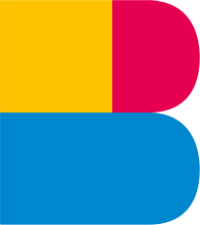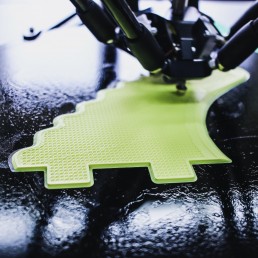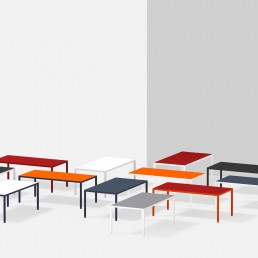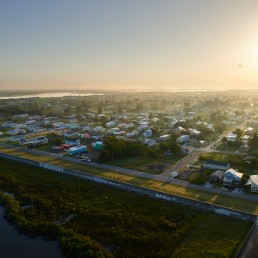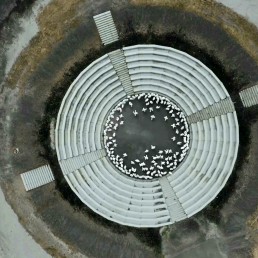
Interconnecting Reality
Is the Global Network the Ideal Organizational Form of the Future?
By Robert Eysoldt, April 2017, Berlin
Digital transformation, cloud computing, big data, automation, the Internet of Things, AI, and robotics; today we find ourselves in a permanent and far-reaching state of technological upheaval and everything is connected to everything. So what kind of network must we forge so that we don’t end up excluded from the playing field?
Every day our lives become a bit “smarter” and more interconnected. The driving force behind this change is connectivity. Twitter, Facebook, Instagram, and Snapchat connect us to the world, the fitness trackers on our wrists provide us with personalized health profiles, our fridges are connected with retailers, and our self-driving cars compile movement profiles that can be evaluated by artificial intelligence. The interconnected world has awakened new demands while simultaneously putting old business models into question. This development carries radical implications for our working environments. Machines with artificial intelligence are already able to take on structured and data-based routine tasks and, according to a study by Oxford University, they will take over almost half of all jobs within just the next two decades.
Here’s the good news for the creative community: While robots with AI will indeed be able to take on many workflows within the creative industry, in terms of creativity they still have a long way to go to catch up with the human mind. Currently, there is still no algorithm that can replace skills such as inventiveness, critical thinking, emotional intelligence, or intuition. At least not yet.
The digital transformation has made work more mobile, collaborative, and dynamic, and the principle of networking also allows us to work together on complex projects across national borders. Mobile devices, mobile internet, and the cloud allow us to access all the data we need, anytime and anywhere, regardless of where we may find ourselves at that moment. We share our knowledge with others, organize ourselves, and communicate across hierarchies.
Digital natives are looking for meaningful tasks
Once you’ve crossed the threshold, you will never go back to Work 1.0. In any case, open networks seem to be much more suitable for exploiting the full innovative potential within creative processes. Startups and the Open Source movement in particular understood early on that more innovative products and services can be achieved when collective creativity, skills, and inspiration become networked. The network therefore seems to be the organizational form of the future and it fits well with the times. The younger generation tends to feel constrained in traditional workplace relations and now expects work to follow the same structures and processes they know from their networked personal lives. With the same self image, the same rules, the same tools, and with maximum flexibility. These digital natives are looking for meaningful tasks, and they want to contribute their own ideas and take on responsibility. They work as permanent employees, freelancers, or even within smaller networks that are not tied to one place. Sometimes, they have several different work contracts at the same time. Why should you work for just one company when you can work for many? This development is increasingly also putting agencies under pressure.
Interdisciplinary teams
So what to do when faced with an increased desire for flexibility and self-determination? Agencies can only come so far using established work processes and personnel structures and quickly push up against their limitations. Table tennis, cozy work atmospheres, and morning yoga are only cosmetic changes and offer nothing significant in terms of innovative solutions. Agencies need new concepts and a new self-understanding to create more open and flexible communication processes. Within and without. Agencies that have understood this have now departed from their rigid departmental and unit structures and set up interdisciplinary teams across the company to meet the requirements of individual projects. Sometimes they also work together with other specialized agencies within cooperative networks or within their own agency’s network, which they have built up with branches in different cities.
The project teams that are created are largely composed of permanent staff and freelancers who cooperate on a project within the agencies “under one roof”. Cloud workers who are placed in positions of responsibility and well-integrated into the project but work from another location still remain highly underrepresented in such team structures. This results from a fear of losing control and because, over the years, agencies have become locked into existing hierarchies and processes that are unable to adequately accommodate networked work. To be competitive, unrestricted access to exceptional services in a globalized market is key. Agencies must focus less on local ownership and more on global access, with the clear goal of locating top experts with specialist knowledge worldwide and introducing them into their networks, so that, when necessary, they can be fluidly integrated into flexible team structures.
For this, agencies need to develop new mindsets and new paradigms at all levels and in all areas. Because whoever hopes to successfully work within open and fluid network structures must also be able to operate within their logic.
Breaking out of old patterns of thinking and acting
This change has brought old standards into question. So, alongside a new infrastructure for interconnected information and communication processes, above all you need the right spaces, rules, and rituals to allow you to develop a collective culture for your decentralized project team. The necessary tools and methodologies for network-based work already exist. You need only to lift your gaze a bit and break out of old patterns of thinking and acting. The sooner the better. Whoever procrastinates too long, staying putin established structures, will soon be overtaken by many small, agile, and fast-paced creative networks.
Of course, such a paradigm shift requires significant intuition and dexterity from all parties involved. After all, the shift from permanent employment to temporary project work is radically changing the intimate bond between agency and employees and will ensure that the stable forms of organization we know today will be dissolved in many fields. This has resulted in a shrinking core team within agencies, with a large part of creative workers appearing at the agency only temporarily or not at all. This development can quickly lead to growing competition, pressure, and unfair remuneration structures — especially when these changes are considered in a global context. The biggest challenge to overcome will be to prevent our wish for flexibility and openness from limiting our personal freedom and taking away our security.
We must hope that agencies do not understand this process purely as a tool of efficiency, and that they are also ready to foster trust and collaboration, and strive for a better future, working together on solutions within temporary, interdisciplinary, global, liquid networks. A future in which important issues can be tackled together while also allowing sufficient space for creative work without fixed expectations of what the results should look like. ■
